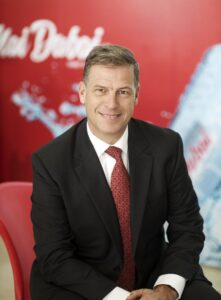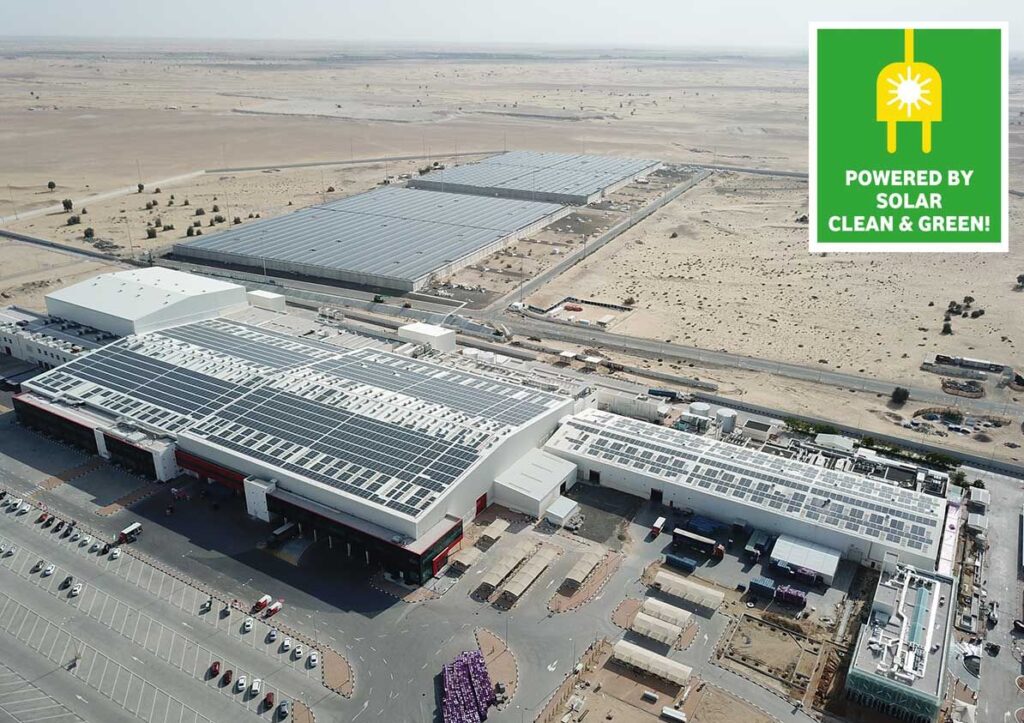Hannah Jo Uy has the story on how the company engineered the first water treatment plant in the region solely powered by renewable energy

Alexander van’t Riet
Alexander van’t Riet is a happy man. As CEO, Mai Dubai, he oversaw the company’s state- of-the-art plant, which was completed last year, and which, he proudly says, serves as a testament to its commitment to sustainable development, and is the fruit of cross- department collaboration, complemented by long-term planning and investment. And the sweetest aspect of the project was that it became the first in the GCC region to achieve the status of a water treatment plant powered solely by renewable energy.
“In the second year of operation, we started to look into our carbon footprint to know what we are doing and to set the scene for how we will do things,” he says.
“Our factory is now seven times bigger, and with that, we had to take the environment into account.” This initiated investments that paved the way for a LEED-certified headquarters, and a solar park next to the factory, offering a total installed capacity of 18 megawatts. The entire process, including water treatment, production, packaging and all the movement inside the head office is 100% from solar energy, Riet says, adding that this makes Mai Dubai the only water company of its size that operates fully on renewable energy. “From an energy perspective, from water treatment through to the logistics within the distribution centre, that entire part is net-zero,” he says. “There are some other onsite production facilities we do for other things that are not part of it. But the entire water factory, the entire water treatment installation, which is the biggest one from the bottle blowing and filling production lines, the monorails that transport all the goods the conveyers and the raw material in the warehouse, it’s 100% solar.”
Riet says that as the factory operates 24/7, intermittency was an important issue that had to be addressed during the design stage. “The sun doesn’t shine 24 hours a day,” he says. “But, we produce way more electricity than we need in the daytime, and that is put into the DEWA grid and in the night, we take the electricity back from the grid.” This net metering scheme, Riet adds, has worked well, considering the factory’s total production exceeds its total consumption, which makes a case for going through the DEWA network rather than using batteries, which would have required enormous investment.
Being a company based in Dubai, Riet says the company was well aware of the importance of ensuring sustainability in terms of meeting HVAC operations. “When you talk about water treatment, it is important to ask, what is the conversion rate of the water, which is the water you get, compared to the water that ends up in the bottle?” he asks. “You will always have wastewater. What do you do with that wastewater? On site, we use our own water treatment plant; the water we don’t use, we use for our cooling towers.” For cooling towers, Riet says, the factory uses polished, RO-treated treated sewage effluent (TSE), and that 60 cubic metres of TSE is fed into the cooling towers on a daily basis.

Riet also spotlights other initiatives and investments in operations that further reinforces the company’s commitment towards sustainability, including integration of technology to become fully automated. “We have monorails that transport the raw material to production to warehouses,” he says. “The monorail is about 1.2 kilometres long, and all the products are transported in monorail. This means you don’t have to drive around a forklift. That might not sound like a big deal, but it is when taking into consideration the environmental impact.” Riet says Mai Dubai has also recently introduced 16-litre PET bottles that are perfectly recyclable. “We send this to homes, and offices, and we offer to take the bottles back and we recycle those,” he says. “We work with companies, we degrade our own plastic. They crush it, and out of that yarn, clothes are being made. So, the team got new uniforms and shirts made from recycled PETs.”
At the end of the day, Riet says, sustainability comes in many flavours, adding that it’s about all stakeholders having a constant consciousness towards the environment, even it means paying a premium, be it for the shareholders to invest in solar, or for consumers to pay for a recyclable bottle. “I think the real and fundamental challenge one is looking at is your expectations on the time,” he says. “The trick with solar, and many other [forms of renewable energy] is you do the capital investment upfront and, ‘energy is free’. It’s not always that way, but in large part it’s the case. Mai Dubai, while it is a limited liability company, the shareholders are part of Dubai Energy and Water Authority (DEWA). Since DEWA is a shareholder, and they run solar plants and are familiar with energy, they were keen for pushing for this initiative. That’s why we have been doing this, and they were supportive. DEWA has a long-term view in mind and the best for environmental aspects – that’s the driver behind it.” Riet says that in view of this, the design input of Etihad ESCO, a sister company and subsidiary of DEWA and a consultant company, was invaluable. “They,” he says, “do the economics and study and help with the execution of the programme, and that’s how we got what we have, and it was delivered within the budget set.”
Copyright © 2006-2025 - CPI Industry. All rights reserved.